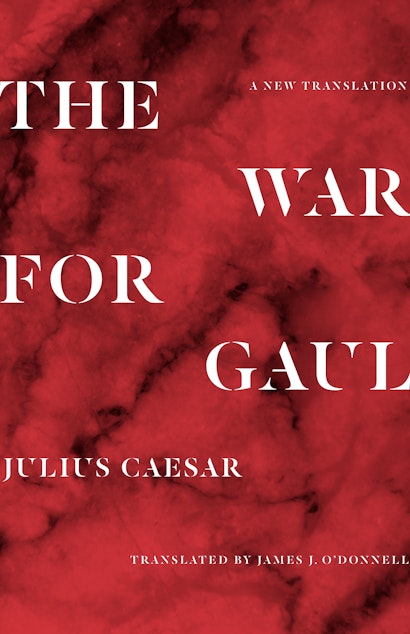Caesar deserves to be compared with Alexander the Great. No one before or since comes close. Command, conquest, and a lasting legacy set them apart from the likes of mere strivers like Napoleon or Hitler. And the war in Gaul was the making of Caesar.
Isn’t that what you would expect a translator of Caesar to say? It’s all entirely true and many have said as much before. But admiring him without understanding him makes us complicit in his ill-doing as well. This translation of his account of the war in Gaul will try to restore your objectivity and freedom of judgment. Make of him what you will.
***
Cormac McCarthy should be the one to write the story of Caesar in Gaul. As insensitive and brutal as McCarthy’s Americans afoot in a land of native and Spanish peoples they wrongly took for uncivilized, Caesar’s armies had little excuse for what they did and they preferred not to remember it once done. But Caesar told their story coolly. Though people die in droves, horribly, on these pages, the Latin word for “blood” appears only twice, near the end.
The facts of the story must be made clear. A general with something to prove, a career to make, and plunder to be harvested for financial gain was handed an army and a province and a guarantee he would have both for long enough to make serious mischief. He spent nine years battering his way through his province and the rich and promising lands beyond, bullying allies and brutalizing the resistant. By the time he was through, the lands and peoples that obeyed his commands—and those of his successors for another half millennium—had been vastly increased, and he was poised to make himself master of the world, or at least the world that stretched from the English Channel to Damascus.
He had no business doing any of this. His colleagues admired his chutzpah, knowing that he went far beyond every reasonable moral or legal boundary. His excesses were possible because he was in competition with two other monsters, one of whom fell in battle at the opposite end of the world while Caesar was in Gaul, the other of whom let Caesar go too long, then fought him, then fled, and ended up hacked to death by the minions of a king who thought it prudent to curry favor with Caesar.
But the book Caesar wrote is magnificent: amoral, certainly, but clear, vivid, and dramatic, a thing to be remembered and read for the ages. Books about war often make us sympathize with the wretchedness of the victims. This one forces us to be Romans of the kind its author wanted to be. We read it nervously, cheering for a bullfight we didn’t want to attend and don’t approve of, admiring the grace of the awesome minuet that floods the sand with blood. There is no denying that this is a great work of literature, one of the greatest, and at the same time, there should be no denying that it is a bad man’s book about his own bad deeds. I think it is the best bad man’s book ever written.
But many will resist my saying the plain fact. Because his carven prose depends on a deliberately restrained vocabulary and a terse, correct style, the book has been thought suitable for schoolboys for many generations, until about the time Latin schoolmasters discovered finally that women can read too. Now the book is in disfavor, for the wrong reasons: because it is about war, and because it is too easy. But we all need to read books about war if we are to avoid dying in one, and this book is anything but easy.
The best reasons for not teaching this book to the young are that it gets war exactly right and morals exactly wrong, and that it achieves a crystalline purity of style that looks easy from every angle but proves to be sternly difficult and demanding when faced flat on. This is a book for the middle-aged and sober, for those who know that the world is not run according to their tastes and never will be, for those who listen best to the author who has truly mastered his language, whatever he has to say—and who think that such an author must indeed have something important to say and hear.
The book pretends to be a set of notebooks, commentarii, the sort of official memos generals sent home to inform their masters of their deeds, the sort historians could come along and use to construct genial and politically agreeable accounts of great events. The style is meant to look simple and to seduce. When we read it, we are meant to think we are getting the plain facts, direct and unvarnished. The old maxim is ars est celare artem—“never let ’em see you sweat” captures the sense of that shopworn Latin phrase. Nobody ever saw Caesar sweat.
Translators of Caesar have always been helpful—much too helpful. Surely, they think, the reader just wants to know what really happened. Caesar would be pleased to think that’s what we think he’s offering. The effect of this connivance with the general is not only to be found in the maps and diagrams and illustrations that go with the best translations but in the expansiveness and preemptively explanatory construction of every sentence. The translations I’ve looked at in English generally add almost as many words again as Caesar needed in the original, so that he becomes downright chatty and helpful. No. This book is fiercely austere, for brave and attentive readers, ready to march twenty-five miles a day under full pack and be ready for more tomorrow.
This essay is an excerpt from The War for Gaul: A New Translation by Julius Caesar, translated by James J. O’Donnell.
About the Translator
James J. O’Donnell is professor of history, philosophy, and religious studies and University Librarian at Arizona State University. His books include Pagans, The Ruin of the Roman Empire, and Augustine: A New Biography.

